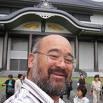Chapter
8: Prophecy
of Enlightenment for Five Hundred Disciples [Gohyaku Deshi Juki]
Now when Nichiren
and his disciples chant Nam Myoho Renge Kyo they are bestowing on both learners and adepts a prophecy that, as Shakyamuni
said, 'all persons [will be] equal to me, without any distinction between us,' are they not? On all of them,
wise and ignorant alike, we bestow the prophecy of Nam Myoho Renge Kyo, 'forcing them to listen, even though it
angers them.' (Gosho Zenshu p 735)
The sutra states,
"World Honored One, it was like the case of a man who went to the house of a close friend and, having become drunk on
wine, lay down to sleep. At that time the friend, had to go out on official business. He took a priceless jewel, sewed it
in the lining of the man's robe, and left it with him when he [the friend] went out. The man was asleep drunk and knew nothing
about it [the jewel]. When he got up, he set out on a journey to other countries." (LS p 150, 3LS p177)
The wine [on which
the poor man gets drunk] represents ignorance. 'Become drunk' indicates disbelief, while 'got up' indicates
faith. Now when Nichiren and his disciples chant Nam-myoho-renge-kyo, they awaken from the stupor of fundamental darkness.
When we chant Nam Myoho Renge Kyo, our ignorance changes to revelation because of the Mystic Law. (Gosho Zenshu
p 735)
The sutra states,
"When the poor man saw the jewel, his heart was filled with great joy." (LS p 152, 3LS p 179)
The 'poor man'
represents all the people of Japan [all humanity]; 'the jewel' indicates the Daimoku, or the Gohonzon;
'at heart' means both body and mind. 'Great joy' indicates the enlightened state of faith in which earthly desires
are transformed into enlightenment and the sufferings of birth and death into nirvana. When we first realize that our own
mind is inherently Buddha, that is called 'great joy.' Nam-myoho-renge-kyo is the 'great joy' among joys.
(Gosho Zenshu p 788)

